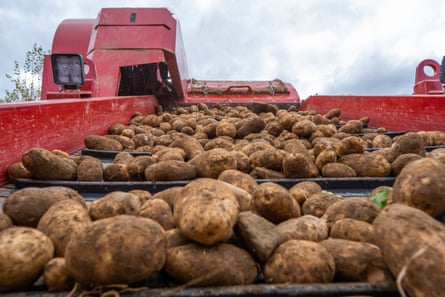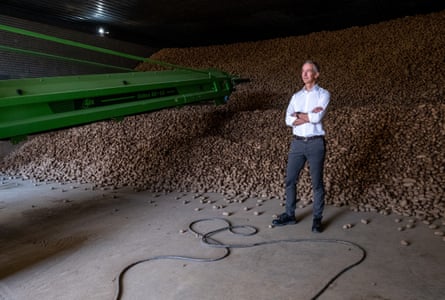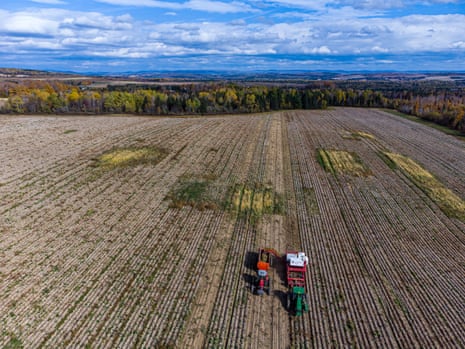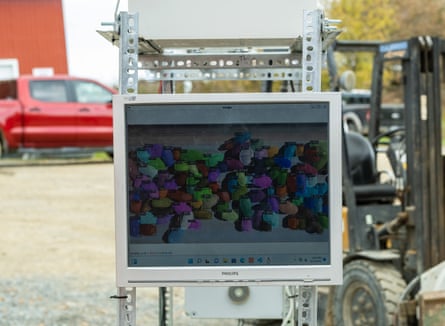[ad_1]
aIn opposition to a backdrop of blue skies and autumn leaves that may make an Instagram filter blush, a gaggle of agricultural postgraduate college students at a New Brunswick farm are tinkering with know-how they hope will sooner or later assist remedy an existential disaster. Miley: How you can Save the World’s Potatoes.
The Canadian farm in Florenceville is owned by the McCain household, the inheritor to the 65-year-old frozen meals enterprise that’s now the biggest producer of frozen potato merchandise on the planet and provides restaurant giants together with McDonald’s. The corporate claims that one out of each three fry on the planet is McCain fry.
However like a rising variety of folks within the meals and agriculture sectors, executives at McCain Meals fear about what the weirdness of the world’s climate means for his or her enterprise and the way forward for the planet.
Max Koune, a multilingual Luxembourgish CEO and president of McCain, has a worldwide view of how shortly the local weather disaster is affecting the world. McCain owns potatoes from almost 3,500 farmers all over the world, from small farmers to giant company farms, and is up to date day by day on how the local weather is altering.

“Once I joined we had a foul harvest each 10 years which was ‘historic’ – you wouldn’t know when it was coming. For the final 10 years, there was a foul crop someplace yearly,” Koune it’s mentioned.
The New Brunswick “farm of the longer term” is a collection of labs that the corporate plans to roll out all over the world because it exams which practices are finest fitted to saving potatoes whereas reducing the corporate’s carbon emissions. . McCain has dedicated to decreasing its emissions by half by the tip of the last decade.
Totally different geographic circumstances would permit McCain to evaluate totally different environments. New Brunswick has a brief rising season and winters. In South Africa, the place one other farm is being established, potatoes are grown year-round however water shortage is (traditionally) extra of an issue than in rain-fed Canada.
Not that Canada would not have any water issues both. Crops have been affected by floods in 2018 and 2019. A warmth dome introduced “head-shaking” temperatures throughout giant elements of Canada and the US in 2021. Droughts in Europe and the UK have additionally damage potato yields, decreasing them to double digits. , “We will not use the previous to know what’s going to occur to our enterprise,” Coeun says.

With populations growing and temperatures rising, it’s important to maneuver in direction of a extra sustainable future in agriculture. In response to a 2018 evaluation of the impression of the meals system on the surroundings revealed in Nature, if the programs we use now don’t change, the environmental impression of the meals system may enhance by 50%–90% by 2050. Reaching that degree is past the boundaries of the planet that outline a protected working area for humanity”.
You need to consider potatoes like a human, Coune says. “They like temperate climates. They shiver when it is too chilly and sweat after they’re too scorching. That is all they should develop.” After 10,000 years of domestication, our more and more turbulent world now threatens the way forward for the third most vital meals crop after rice and wheat.
“What is occurring impacts us as producers, us as folks, us as an organization. Now we have to consider it otherwise,” Koune says.

Mannequin Farm sounds just like the Star Trek for potatoes: a global, multicultural crew armed with laptops, sensors and drones is boldly going the place no potato farmer has gone earlier than.
A postgrad crew from Dalhousie College is engaged on a crop-spraying rig that makes use of synthetic intelligence to determine crop-damaging bugs and weeds. As an alternative of spraying throughout the sphere, the pattern-recognition system detects undesirable invaders and nozzles instantly to focus on them. It takes solely 200 milliseconds to detect and spray a beetle.
Humphrey Mambo, a PhD scholar, excitedly exhibits a small blue flag representing a bug on the backside of a nozzle to indicate the way it works. Spritz! The flag is useless. He calculates that the spray rig can reduce pesticide use by 50%-80% and says it will possibly simply be retrofitted to present machines.
On a potato-sorter, or “autonomous imaginative and prescient tuber grading machine,” sensors scan potatoes as they enter the storage shed. Knots of purple, inexperienced and blue seem on the display screen, as distinct variations of Ugo Rondinone’s brightly coloured rock sculptures. The machine scans for gravity and density, essential for fry high quality and issues like “hole coronary heart”—when cavities kind in a tuber.


Historically, farmers have manually sampled a small variety of potatoes from a area to determine the standard. This new system, nevertheless, assesses seven out of each 200 potatoes, giving an excessive amount of information to determine issues and even hint them again to the place they originated.
One other unit prepares bodily and chemical maps of the area by studying gamma rays. McCain scientists are additionally utilizing DNA sampling to measure the biodiversity of their plots, satellite tv for pc imagery to see how crops are rising and to seize the large image.
Not all initiatives are high-tech, and Yves Leclerc, director of agronomy, North America at McCain Meals, thinks we’re too obsessive about toys. “It’s all concerning the soil. It’s the soil that issues,” he says earnestly, operating to the sphere to scoop out the crops and handful of soil.

The farm is testing initiatives to scale back tillage, which helps the soil retain extra natural matter. Cowl crops have been planted to guard the sphere after the potatoes are harvested – final 12 months the crew planted 28 totally different varieties. That is an age-old observe during which crops present vitamins for the soil and shield in opposition to pests – for instance, millet helps shield in opposition to nematode bugs. This 12 months, Leclerc worries that he has planted an excessive amount of pigweed and lambs-quarters. “We’re coping with a posh system. It is no easy recipe, all issues evolve.”
Cowl crops additionally assist the soil retain water. Dr. Manphool Fageria, Senior Scientist and Supervisor, Future Farms, says, “The easiest way to fight rising temperatures is to maintain water within the soil.” “In 2020 growers misplaced 35% of their produce right here as a result of it was too dry.”
Cowl crops value extra when it comes to labor in addition to seeds. However they’re cheaper than long-term alternate options, soil erosion, Fageria says. And in a neat synthesis of outdated and new, all the information that farmers at the moment are in a position to accumulate can pinpoint which cowl crops finest assist enhance their yields.
McCain’s fields are in stark distinction to the naked brown vacant land of his potato-growing neighbors. The corporate is hoping that its experiments will encourage others to comply with swimsuit. Virtually all the world’s meals is grown within the high layer of soil, however fashionable agricultural practices have misplaced half of the planet’s most efficient soils over the previous 150 years.


An outdated technique of farming is being examined in one other space. A herd of cows, borrowed from a neighbor’s farm, graze and lazy moo, chopping vegetation and unloading manure. Fageria comes to indicate how the herd is moved across the area with remote-controlled cellular fencing. Fences are costly and Fageria is contemplating switching to digital collars that may maintain the cows inside outlined GPS coordinates. Cows appear very comfy with Fageria, maybe as a result of she is a vegetarian or maybe as a result of she raises camels, goats and sheep on a farm in Rajasthan, India. “Now we have separated the animals from the manufacturing of crops. In that system compost turns into an issue. Therein lies the answer,” he says.
The keenness is clear, however how can it come to the fore within the face of rising inflation and farmers battling the local weather emergency?
The undertaking will not make a distinction if farmers do not buy into the change, Coeune admits. “Farmers will not be desirous about ideas. It have to be silly. Now we have to do it, present that it really works and show that it’s financially viable,” he says. “Farmers consider what they see.”
It is solely two years however yields are growing at New Brunswick Farm. And rising laptop energy and falling prices imply that the know-how the McCain crew is utilizing could also be inside attain of many farmers.

Coune says McCain alone can’t change the world. On Thursday, McCain and different huge firms together with Mars and PepsiCo launched a report arguing that the quantity of sustainable agriculture wanted to triple in measurement by 2030.
In France, McCain has partnered with Credit score Agricole to offer loans to farmers investing in sustainable agriculture. McCain incurs curiosity prices whereas farmers repay the capital. It is a deal that will wince publicly owned AG firms however “as a family-owned firm, McCain thinks throughout generations”, Coeun says. “There is no good enterprise for us if there is not a wholesome farming neighborhood.”
McCain’s measures look promising, says Andrew Chelinor, professor of local weather impacts and a crop modeler on the College of Leeds within the UK. “Testing new approaches and measuring success is a wise first step earlier than going large.”
However different specialists steered that McCain must assume huge if he actually desires to vary the meals system. “McCain is the provider for McDonald’s, which serves extra beef than any restaurant chain on the planet,” says Jennifer Molidor, senior meals campaigner on the Heart for Organic Range, based mostly in Tucson, Arizona. “Cowl the crops and do not plow” [farming practices] Window dressing has turn out to be for enterprise as traditional,” she provides. “These practices might have some advantages, however not in the event that they assist the overproduction of even probably the most climate-intensive meals, corresponding to beef.”
“It’s good to scale back fertilizer use and transfer away from monoculture,” says creator and professor Raj Patel, however he provides, means pushing in opposition to present financial coverage, which helps manufacturing of probably the most environmentally dangerous meals. does. actions.
“There’s going to be lots of skepticism,” admits Koune. Noting greenwashing, which has undone many different “sustainable” initiatives, McCain says it is going to publish its findings often and be as clear as potential because it tries to win over folks. . Folks shouldn’t underestimate the reluctance of the agriculture sector, says Koeune. “However the price of not altering is being demonstrated each day. It is relentless. ,
[ad_2]
Supply hyperlink